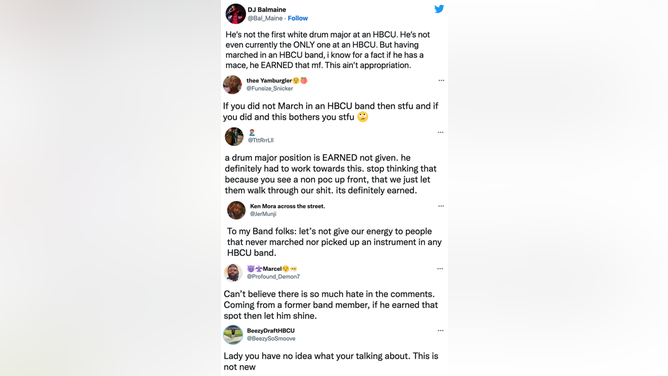Misguided Outrage Stemming From White Drum Major's Race Receives Backlash From Former HBCU Band Members
An HBCU marching band's drum major has sparked significant outrage over his race, strictly because he is white, and not black. Meanwhile, people who are directly familiar with the culture and how HBCU bands operate, including many former band members, have pushed back at the indignation and have come out in support of the White drum major.
When it comes to HBCU football, often times, the marching bands are more important than the game itself. At the very least, the bands play a major role in fostering school pride and camaraderie.
The first HBCU band was established in 1890 at Tuskegee Normal School. It stemmed from a tradition of all-black brass military and veteran bands following the War of 1812, particularly in New Orleans, which often adopted the theatrical styles of minstrel shows.
Ensembles at other Historically Black Colleges and Universities followed Tuskegee's lead. Shortly thereafter, Alabama A&M University began the swing toward today's style by playing popular songs of the time in addition to its precise, entertainment-focused marches.
HBCU style has only continued to evolve and grow. The earliest indication of today's modern style of marching, which is rooted in high-stepping and elaborate, flashy dance routines that coincide with the technical, brass-blaring, drum-banging music, dates back to Florida A&M University in the 1940s.
All of this goes to say that there is a storied tradition amongst HBCU bands. It is bigger than just a marching band supporting its team in the stands on Saturdays.
At the forefront of each HBCU marching band is the drum major.
Drum majors, who do not play an instrument, fill a different role. First and foremost, they control tempo and impart field direction. They also serve as the face of the band, both literally and figuratively.
A drum major is like the captain of the football team. He or she is a leader. A drum major is also, typically, the first band member on the field and is at the forefront of each and every performance.
To be appointed as a drum major is the highest honor that an HBCU band member can receive. It is a huge deal and it is not taken lightly.
As a result, former and current HBCU marching band members are pushing back on recent outrage.
Benedict College (which produced one of my favorite trombone solos of all-time) is a private HBCU located in Columbia, South Carolina. It was founded in 1870, so its history is immense.
Earlier this year, Benedict's Marching Tiger Band of Distinction named Ethan Strickland as one of its drum majors. Strickland, though at an HBCU, is caucasian.
His race has created a lot of controversy in recent days.
Video of Strickland was posted to Instagram after the Marching Tiger Band's performance on October 8. He was getting after it and the caption celebrated his performance.
However, the video was recently captured and shared on Twitter in a very different light.
Many non-HBCU band members are outraged, claiming that White drum majors are problematic.
Tamorah Shareef Muhammad, a self-proclaimed "Student & Follower of the H.E.M under the leadership of Minister Louis Farrakhan" and "Traditional Wife and Mother" related Strickland's performance to race. She posted the video (without credit to the original poster) and said "We can never have nothing nothing just nothing!!"
Presumably, Muhammad was referring to the fact that a caucasian man was leading an HBCU band. She implied that Strickland's role as a drum major was robbing black people of their culture.
Strickland is not the only non-black drum major at an HBCU. Justin Heideman, known to many as 'Vanilla Funk,' is a drum major at Alabama State.
In addition, The Sonic Boom of the South — Jackson State's band — made history in April when it named Marvin Meda as its first Hispanic head drum major. Both Meda and Heideman have also received a lot criticism for their roles.
There is a subset of groups who agree that Strickland, Meda and Heideman should not be drum majors at an HBCU because of their race. It stems from the ideology that black people are allowing others to take their culture from them.
Criticism of non-Black drum majors with HBCU bands have received a lot of pushback.
In fact, the condemnation of Strickland, Meda and Heidman's roles have been meet with more disagreement than agreement. Many of those who are directly familiar with HBCU band culture and how they operate found Muhammad's outrage to be inappropriate and wrong.
Others agree that the outrage is unwarranted.

Former and current HBCU band members also support White drum majors who earn their spot, which is always the case.
In addition to those who were upset with Muhammad's initial post, former and current members of HBCU bands stood up against her sentiments. They are blasting her for commenting on something that she knows nothing about.

Muhammad's initial sentiment has caused a widespread controversy. But at the end of the day, those who have been a part of an HBCU band are in disagreement with her sentiment. That should say it all.
Strickland, Meda and Heideman have earned their spots as drum majors. To say otherwise — and bring race into the conversation — discredits all of the hard work that the drum majors have put in to get to where they are, it discredits the band director who appointed them, and it discredits the band members who perform alongside them. In turn, it discredits the very culture that Muhammad claims is being stolen.